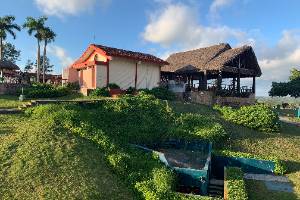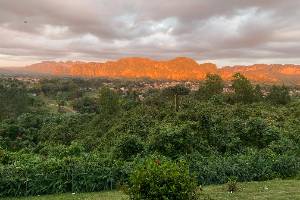The Cuba Experience
Short Term Faculty-led Study Abroad
Open to all majors, The Cuba Experience offers students an opportunity to learn about Cuba's unique culture, history, music & dance, architecture & art, religion, economy, politics, and international relations.
Email%3A%20Dr.%20Ken%20SchweitzerAssociate Professor in Music
The Cuba Experience offers students the unparalleled opportunity to learn first-hand about Cuba through an academic lens. In collaboration with their professors, students will design and conduct authentic field research into the intersection of music, religion, dance, food, and culture in Havana, the oldest city in the New World. Students will also visit the UNESCO World Heritage Sites surrounding Trinidad de Cuba (founded in 1514). Located in the foothills of Cuba’s second largest mountain range, and just minutes from turquoise waters of the Caribbean, Trinidad’s cobblestoned streets are teeming with music, colorful art, cafes, and nightlife. We’ll also have an opportunity to explore Cuba’s vast biodiversity and unique agricultural systems in and around the small towns Las Terrazas and Viñales, both located in hilly regions of western Cuba. (APPLICATION for January, 2024 Trip)

Program Info
The course is schedule for January 4-13, 2024 (10 Days)
Program Fees
Program cost for the trip is $3,100 ($4100 minus a $1000 internal scholarship)
Cost includes:
- Round trip flight Florida - Havana
- Tourist Card / Visa *
- Travel Medical Insurance (including COVID)
- Emegency Evacuation Insruance
- One night hotel in Miami or Ft. Lauderdale on January 4, 2024
- 8 nights accomodations in Havana & Trinidad (doubles)
- Breakfast (8 day)
- Lunch (4 days)
- Dinner (9 days)
- Bottled water
- Museum, concert, and gallery fees
- Tour guide tips
- Ground transportation in Cuba
Not included in the program cost:
- $500 OPTIONAL Tuition Fee (for those who want 4-credits)
- $100-$300 Flights from home to Miami
- $40-$60 Lunch (5 days)
- Optional tips for tour guides
- Optional souvenirs & snacks
- Optional taxis used during limited “free time.”
*Visas: Most US citizens and many foreign nationals can travel to Cuba using a Tourist Card that can be purchased in the airport. This is generally very easy and does not require any paperwork. We will aquire these for most students. However, some foreign nationals and all persons born in Cuba (regardless of citizenship) are required to obtain a Visa. This should be done well in advance and directly with Cuban embassy. We are happy to give advise about visas, but the ultimate responibility and cost for securing visas for students falling these categories fall to the individual. Please reach out to us with questions and we will do our best to advise.
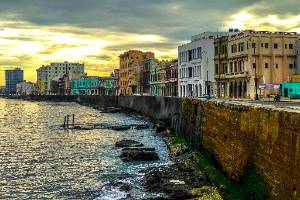 Iconic Malecón - just steps from our rooms
Iconic Malecón - just steps from our rooms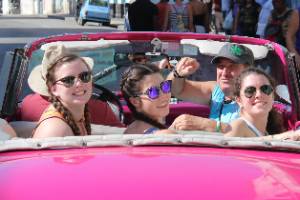 Tour of Havana in convertibles
Tour of Havana in convertibles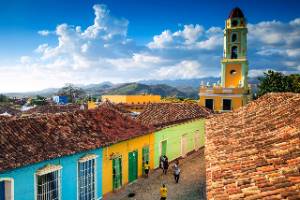 Trinidad - Founded in 1514
Trinidad - Founded in 1514
Deadlines, Deposits, Refunds, and Forms
- October 15
- Signed Application
- October 20
- $500 Deposit. Refundable for any reason until October 20. After October 20, refunds will only be given if the entire trip is cancelled by the school.
- Instructions for making the deposit (as well as details about refunds) are in attached to the Contract, which should be signed an emailed to kschweitzer2@washcoll.edu at the moment the deposit is submitted.
- November 9 Passport Scan to kschweitzer2FREEwashcoll valid through July 20, 2024
- If you have troubles meeting this deadline, just communicate with Dr. Schweitzer
- December 1:
- $2600 balance Balance (or $3100 if you want academic credit - 4 credits).
- Risk & Liability Waiver
- Visa Application | CTS Travel Affidavit
- College Liability Waiver
- Tour Provider Liability Waiver
- Tour Provider Travel Affidavit
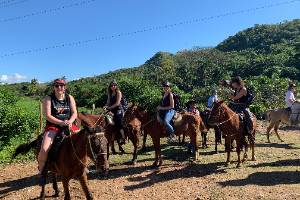 Valle de Los Ingenios - Trinidad de Cuba
Valle de Los Ingenios - Trinidad de Cuba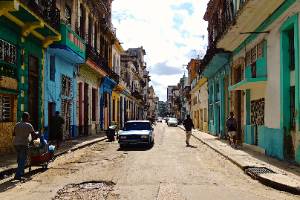 Centro Havana near our guest rooms
Centro Havana near our guest rooms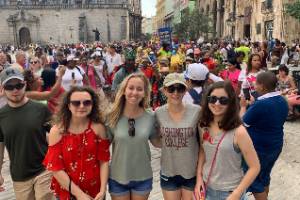 Street Festival in Havana
Street Festival in Havana
Academic Info
- Students who register for credit can request either a MUS or ANT designation (ANT
is the default). WC students can use the course to satisfy: Business Global Learning
Requirement, International Studies Experiential Learning Requirement (and potentially
Study Abroad), Fine Arts Distribution, Social Science Distribution, Music Major/Minor
Electives, Anthropology Major/Minor Electives and/or Ethnomusicology Requirements.
- This is an immersive & experiential course. While in Cuba students will have a full day (and often evening) of structured and unstructured activities including tours, concerts, and dance classes. Though we will have lots of open deicussions, we will not be lecturing to students. Instead, students are expected to learn as much as possible about Cuban history & culture prior to travel.
- Activites/Work Prior to Departure
-
2 short books & response papers
-
3 video/documentaries & online discussion
-
NPR Popdcasts (listening only)
-
Pre-Travel Listening Quiz (to introduce students
-
Several pre-travel lectures, discussions, & trainings (virtual and in-person)
-
- Graded activites while in Cuba
- Ethnographic Journaling
- Observation-oriented writing
- Class Discussions
- Activites/Work After Return to the US
- Multi-media Journal
- 4 pages post-trip synthesis paper
 Dance Class in Havana (with social distancing)
Dance Class in Havana (with social distancing)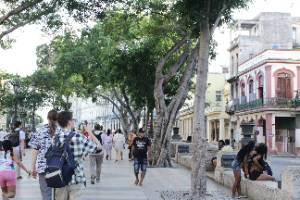 Pedestrian walk 4 blocks from our rooms
Pedestrian walk 4 blocks from our rooms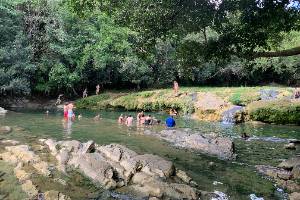 Escaping the mid-day heat in Las Terrazas
Escaping the mid-day heat in Las Terrazas
Itinerary
Now entering its ninth year, The Cuba Experience has an established history of ensuring a safe, educational, and fun environment for growth and transformation among our students. While the unknown is sure to generate anxiety among participants and their families, we ask for flexibilty and patience as we rarely finalize the day-to-day itinerary more than just a few weeks prior to departure. This year in particualty, the logistical challenges we face are substantial. The main variables that will determine when we can share a detailed itinerary are:
- COVID-19 and it's affect on museums, concert venues, and transportation.
- The impact of an incoming US adminstration on US-Cuba policy.
- The availability of featured musicians, artisans, and guides
- Weather forcasts - since many of our activities are outdoors
To give a better idea of what the trip looks like, however, we provide below an overview of the types of housing, food, activities, and opportunites we typically offer:
Hotels & Homestays
Miami or Ft. Luaderdale, Florida
Students should make their own way to our hotel in the Miami/Ft. Lauderdale region
on the evening of June 10. Around 6PM, we will gather in the lobby and head out for
a meal in local restaurants (unless COVID requires us to later our plans). Students
should plan to land in Florida by 4PM. If necessary, we can accomodate late arrivals.
Havana
During our 4-6 nights in Havana, our group stays in professional government-sanctioned guest rooms in the homes of
working class Cubans. Each licensed guest room has air conditioning. Guests have access
to guest-only restrooms and refrigerator. All of our rooms are located in houses within
a 2 block radius of each other. We will be one block from the Malecón (the iconic
seawall in Havana) and 6 blocks from the tourist district and old town Havana. We
will likely not have access to television, phones, cell phones, or internet – such
luxuries are only just now making their way to the average person in Havana.
Trindad de Cuba
We typically spend two-three nights in Trinidad, where we use similar guest rooms
as in Havana. A small but vibrant town, Trinidad is very walkable (aside form the
rough cobblestone streets that are known to twist ankles). Our homes are a mere 100
yards form the very center of town.
Viñales
In Viñales, we typically stay in a mountain-top hotel with sweping views of the picturesque
valley. As of November 2020, the US department of treasury has prihibited Americans
from using any hotel in Cuba. We hope that this regulation will soon be revered. If not, we will
adjust and move into private guests rooms just a short walk from the center of this
small tourist town.
